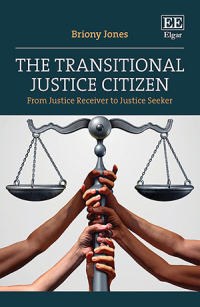Hardback
The Transitional Justice Citizen
From Justice Receiver to Justice Seeker
9781803925110 Edward Elgar Publishing
Building a thorough and comprehensive understanding of the limits of transitional justice theory in historically understudied regions, this innovative book proposes a new concept of the transitional justice citizen as both an active seeker and receiver of justice. Briony Jones addresses contemporary criticism of transitional justice theory and practice in order to improve our understanding of the agency of people at times of transition.
More Information
Critical Acclaim
Contents
More Information
Building a thorough and comprehensive understanding of the limits of transitional justice theory, this innovative book proposes a new concept of the transitional justice citizen.
Throughout the book, Briony Jones addresses contemporary criticism of transitional justice theory and practice in order to improve our understanding of the agency of people at times of transition. Drawing on three diverse case studies from across the globe, chapters demonstrate how the transitional justice citizen is defined by transitional justice discourse, policy and practice, and through acts of claiming justice such as protests and political violence. Combining in-depth theorization with empirical insights, this perceptive book positions the concept of citizenship within the context of long-term historical political struggle and the contemporary importance of justice.
Investigating the current debates and key research gaps in the field of transitional justice, this book will be vital reading for students and scholars of transitional justice, including those focusing on peacebuilding, citizenship, democratization, and political geography. It will also be beneficial for transitional justice practitioners who wish to reflect on their practice and compare their work with other case studies.
Throughout the book, Briony Jones addresses contemporary criticism of transitional justice theory and practice in order to improve our understanding of the agency of people at times of transition. Drawing on three diverse case studies from across the globe, chapters demonstrate how the transitional justice citizen is defined by transitional justice discourse, policy and practice, and through acts of claiming justice such as protests and political violence. Combining in-depth theorization with empirical insights, this perceptive book positions the concept of citizenship within the context of long-term historical political struggle and the contemporary importance of justice.
Investigating the current debates and key research gaps in the field of transitional justice, this book will be vital reading for students and scholars of transitional justice, including those focusing on peacebuilding, citizenship, democratization, and political geography. It will also be beneficial for transitional justice practitioners who wish to reflect on their practice and compare their work with other case studies.
Critical Acclaim
‘Lucid and persuasive in equal measure, this is the first sustained engagement with how the citizen is constructed and imagined in transitional justice. A multi-dimensional study of everyday agency as transitional justice plays out, it makes a compelling case for more responsive and more effective approaches, but eschews familiar easy answers.’
– Padraig McAuliffe, University of Liverpool, UK
‘This is an important contribution to an emerging critical studies literature on transitional justice that starts with the deceptively simple premise of looking at the post-conflict context from the inside-out, putting the people themselves at the center of analysis. The power and challenge of this approach is that it asks us to look beyond the usual mental maps and implicit assumptions about what justice is supposed to mean, together with the means by which justice should be brought about.’
– Dustin Sharp, University of San Diego, US
– Padraig McAuliffe, University of Liverpool, UK
‘This is an important contribution to an emerging critical studies literature on transitional justice that starts with the deceptively simple premise of looking at the post-conflict context from the inside-out, putting the people themselves at the center of analysis. The power and challenge of this approach is that it asks us to look beyond the usual mental maps and implicit assumptions about what justice is supposed to mean, together with the means by which justice should be brought about.’
– Dustin Sharp, University of San Diego, US
Contents
Contents: 1. Introduction: contextualizing the struggle for justice to learn from the citizen PART I THE CITIZEN AS JUSTICE RECEIVER 2. The citizen as rights bearer: victims, norms and transitional justice entrepreneurs 3. The citizen as duties bearer: participation, outreach and consultation 4. The citizen as a holder of virtues PART II THE CITIZEN AS JUSTICE SEEKER 5. We can make claims too: acts of inclusion in Côte d’Ivoire 6. These claims should be included: acts of expansion and Tunisian Black activism 7. We can make claims in this way: acts of disruption and education reform in Brčko District, Bosnia-Herzegovina 8. Conclusion to The Transitional Justice Citizen Bibliography Index




